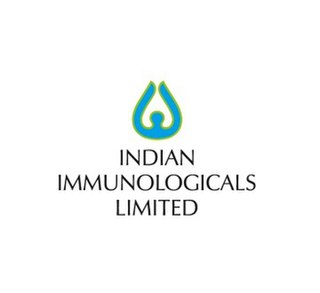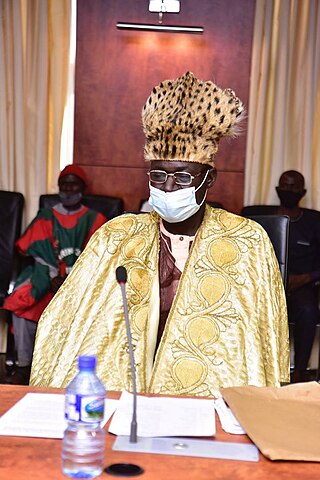Related Research Articles
A zoonosis or zoonotic disease is an infectious disease of humans caused by a pathogen that can jump from a non-human vertebrate to a human. When humans infect non-humans, it is called reverse zoonosis or anthroponosis.

Virulent Newcastle disease (VND), formerly exotic Newcastle disease, is a contagious viral avian disease affecting many domestic and wild bird species; it is transmissible to humans. Though it can infect humans, most cases are non-symptomatic; rarely it can cause a mild fever and influenza-like symptoms and/or conjunctivitis in humans. Its effects are most notable in domestic poultry due to their high susceptibility and the potential for severe impacts of an epizootic on the poultry industries. It is endemic to many countries. No treatment for VND is known, but the use of prophylactic vaccines and sanitary measures reduces the likelihood of outbreaks.

The Pirbright Institute is a research institute in Surrey, England, dedicated to the study of infectious diseases of farm animals. It forms part of the UK government's Biotechnology and Biological Sciences Research Council (BBSRC). The institute employs scientists, vets, PhD students, and operations staff.

The Vaccine and Infectious Disease Organization (VIDO) is a research organization of the University of Saskatchewan that operates with financial support from the Government of Canada, the government of Saskatchewan, livestock industry councils and agencies, foundations and human and animal health companies. In addition to the 2,500,000 sq ft (230,000 m2) facility on campus, VIDO also operates a 160-acre (0.6 km2) research station.

IDEXX Laboratories, Inc. is an American multinational corporation engaged in the development, manufacture, and distribution of products and services for the companion animal veterinary, livestock and poultry, water testing, and dairy markets. Incorporated in 1983 by David Evans Shaw, the company is headquartered in Westbrook, Maine, and in Hoofddorp, Netherlands for its EMEA divisions.

The University of Veterinary and Animal Sciences, or UVAS originally known as Lahore Veterinary College, is a public university located in Lahore, Punjab, Pakistan.

Guru Angad Dev Veterinary and Animal Sciences University is a veterinary university in ludhiana Punjab, india. It was a part of Punjab Agricultural University and was established on 21 April 2006 to serve the society by promoting the livestock production, health and prevention of diseases through integrated teaching and extension programs. The mission of the college is to produce veterinary graduates, scientists and extension workers for promoting better livestock health, by prevention of disease, increasing production and reproduction of livestock, thus improving the quality of rural life in Punjab.

Influenza, commonly known as the flu, is an infectious disease caused by influenza viruses. Symptoms range from mild to severe and often include fever, runny nose, sore throat, muscle pain, headache, coughing, and fatigue. These symptoms begin one to four days after exposure to the virus and last for about two to eight days. Diarrhea and vomiting can occur, particularly in children. Influenza may progress to pneumonia from the virus or a subsequent bacterial infection. Other complications include acute respiratory distress syndrome, meningitis, encephalitis, and worsening of pre-existing health problems such as asthma and cardiovascular disease.

In animals, rabies is a viral zoonotic neuro-invasive disease which causes inflammation in the brain and is usually fatal. Rabies, caused by the rabies virus, primarily infects mammals. In the laboratory it has been found that birds can be infected, as well as cell cultures from birds, reptiles and insects. The brains of animals with rabies deteriorate. As a result, they tend to behave bizarrely and often aggressively, increasing the chances that they will bite another animal or a person and transmit the disease.
Federal College of Animal Health and Production Technology, Vom is one of the Federal Colleges of Agriculture in Nigeria. It is located within The National Veterinary Research Institute (NVRI), Vom, Jos South LGA, Plateau State, Nigeria. It is saddled with training of middle level manpower in Animal Health, Animal Production, Livestock Extension/ Management Services and Vocational Training who could effectively utilize their training to establish and manage livestock farms.nt

Indian Immunologicals Limited (IIL) is a subsidiary of the National Dairy Development Board. It is based in Hyderabad, Telangana, India. IIL is registered in India as a Public Limited Company under the Companies Act, 1956, It was established in 1982 by the National Dairy Development Board.
The Moredun Research Institute is a scientific research institution based at the Pentlands Science Park, in the Bush Estate area of Midlothian, Scotland. It conducts research into diseases of farm livestock and the promotion of animal health and welfare.
Robyn Gwen Alders AO is the first female veterinary scientist to be made an Officer of the Order of Australia. Dr. Alders is most recognised for her work on food security by improvements in poultry health in developing countries. Alders' work on the maintenance of the health of small poultry flocks helps under-resourced women to provide adequate nutritional and financial support for their families.
The Global Alliance for Livestock Veterinary Medicines (GALVmed), formerly the Global Alliance for Livestock Vaccines (GALV), is a not-for-profit livestock health product development and access partnership. It operates as a public-private partnership and a UK registered charity headquartered in Edinburgh.
A foreign animal disease (FAD) is an animal disease or pest, whether terrestrial or aquatic, not known to exist in the United States or its territories. When these diseases can significantly affect human health or animal production and when there is significant economic cost for disease control and eradication efforts, they are considered a threat to the United States. Another term gaining preference to be used is transboundary animal disease (TAD), which is defined as those epidemic diseases which are highly contagious or transmissible and have the potential for very rapid spread, irrespective of national borders, causing serious socio-economic and possibly public health consequences. An emerging animal disease "may be defined as any terrestrial animal, aquatic animal, or zoonotic disease not yet known or characterized, or any known or characterized terrestrial animal or aquatic animal disease in the United States or its territories that changes or mutates in pathogenicity, communicability, or zoonotic potential to become a threat to terrestrial animals, aquatic animals, or humans."
Ceva Santé Animale (Ceva) is a multinational animal health company based in Libourne, France. Established in 1999, Ceva undertakes research, development, production and marketing of pharmaceutical products and vaccines, and also provides complementary services and equipment, for companion animals, poultry, ruminants and swine.

Animal vaccination is the immunisation of a domestic, livestock or wild animal. The practice is connected to veterinary medicine. The first animal vaccine invented was for chicken cholera in 1879 by Louis Pasteur. The production of such vaccines encounter issues in relation to the economic difficulties of individuals, the government and companies. Regulation of animal vaccinations is less compared to the regulations of human vaccinations. Vaccines are categorised into conventional and next generation vaccines. Animal vaccines have been found to be the most cost effective and sustainable methods of controlling infectious veterinary diseases. In 2017, the veterinary vaccine industry was valued at US$7 billion and it is predicted to reach US$9 billion in 2024.

David Lee Suarez is an American virologist and immunologist.

Dr. Josiah Tagwai Kantiyok is the second indigenous monarch of Fantswam (Kafanchan) Chiefdom, a Nigerian traditional state in southern Kaduna State of Nigeria. He was crowned as Agwam Zikpak II by the state government although his predecessor was Agwam Fantswam I.
The Botswana Vaccine Institute (BVI) is a veterinary research institute owned by the Botswana government that carries out research on communicable diseases in domestic animals, with emphasis on viral transmitted infections. BVI manufactures vaccines against major animal diseases for use in Botswana and for sale in 16 African and Middle Eastern countries. BVI is a "leader in the research, manufacture and supply of livestock vaccines".
References
- ↑ "About NVRI | Lidiski" . Retrieved 2023-06-02.
- ↑ ""Science is an adventure": enhancing gender equality to foster development in Nigeria". WOAH - Africa. 2022-02-11. Retrieved 2023-06-02.
- ↑ "Maryam Rabiu Muhammad | Equal Access Nigeria" . Retrieved 2023-06-02.
- ↑ "About - About". current.url.com. Retrieved 2023-06-02.
- ↑ "National Veterinary Research Institute". Commonwealth of Nations. Retrieved 2023-06-02.
- ↑ "NVRI: An enduring animal disease control centre - Daily Trust". dailytrust.com. Retrieved 2023-06-02.
- ↑ "Sanwo-Olu Builds 216 Homes in Lagos Communities - THISDAYLIVE". www.thisdaylive.com. Retrieved 2023-06-02.
- ↑ "NVMA wants special palliatives for poultry, livestock feed millers". Tribune Online. 2020-04-21. Retrieved 2023-06-02.
- ↑ keeper, House (2020-04-16). "COVID-19: NVRI set to begin test in Plateau – Official". Blueprint Newspapers. Retrieved 2023-06-02.
- ↑ "NVMA wants special palliatives for poultry, livestock feed millers". Tribune Online. 2020-04-21. Retrieved 2023-06-02.
- ↑ David (2020-04-19). "COVID-19: Vet doctors demand stimulus package, safety net for livestock operators, feed millers". The Sun Nigeria. Retrieved 2023-06-02.
- ↑ "Courses Offered in Federal College Of Animal Health And Production Technology, Vom, Plateau State". www.manpower.com.ng. Retrieved 2023-06-02.
- ↑ "FCAH&PT, Vom | Welcome". portal.fcahptvom.edu.ng. Retrieved 2023-06-02.
- ↑ "Taking science beyond the laboratory- helping researchers, farmers, and policy makers in Nigeria". The Pirbright Institute. 2022-05-18. Retrieved 2023-06-02.
- ↑ "Viral Research - Viral Research". current.url.com. Retrieved 2023-06-02.
- ↑ "Bacterial Vaccine Production - Bacterial Vaccine Production". current.url.com. Retrieved 2023-06-02.
- ↑ "Viral Vaccine Production - Viral Vaccine Production". current.url.com. Retrieved 2023-06-02.
- ↑ Cyril (2019-07-30). "Animal vaccines: Nigeria performing poorly- FG". The Sun Nigeria. Retrieved 2023-06-02.
- ↑ "Stakeholders call for privatisation of animal vaccine production". The Guardian Nigeria News - Nigeria and World News. 2019-11-15. Retrieved 2023-06-02.
- ↑ "'NVRI to produce COVID-19 vaccine' - Daily Trust". dailytrust.com. Retrieved 2023-06-02.